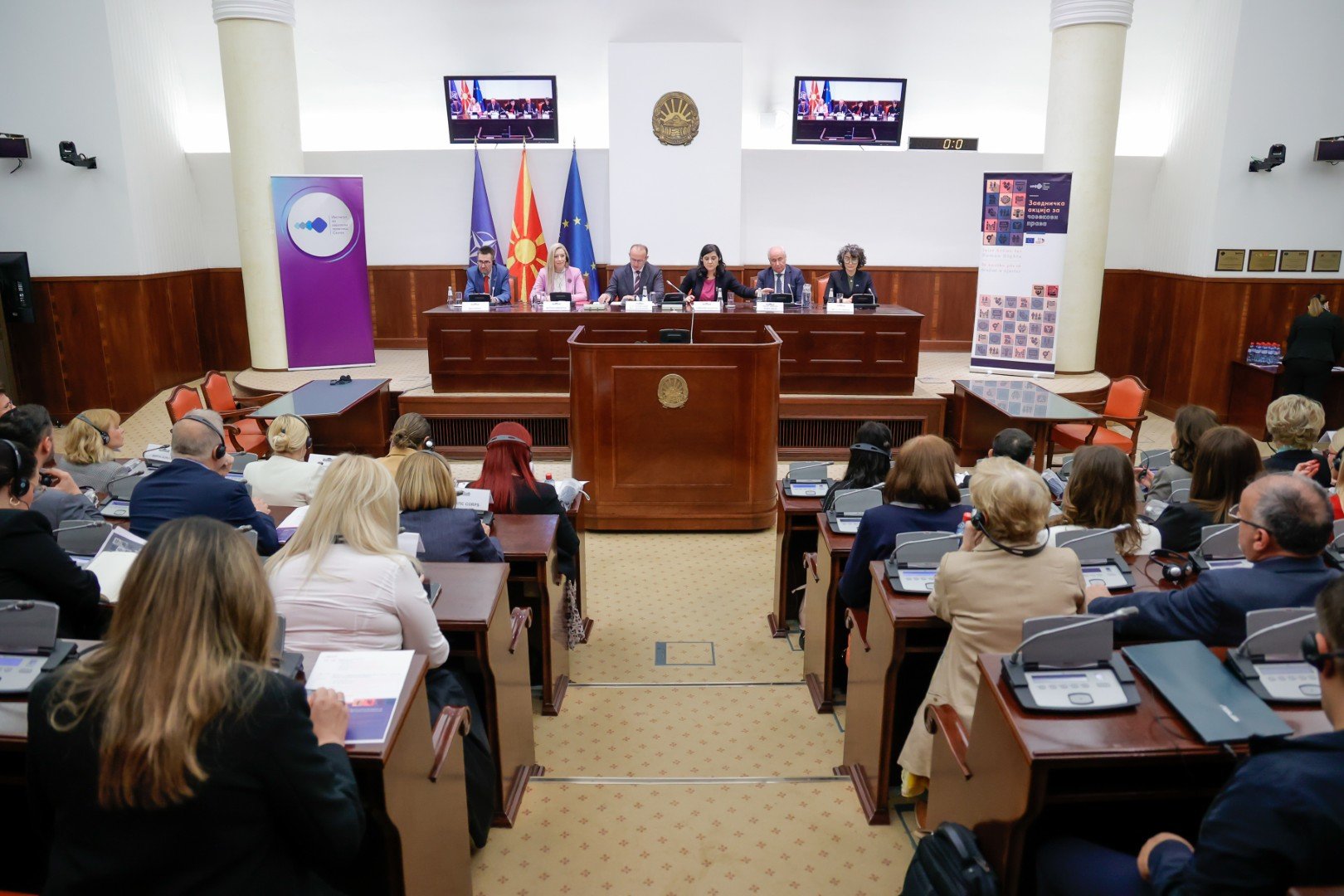On 23 April, EPI organized an international conference at the Parliament of the Republic of North Macedonia titled “Bridging Policy and Practice: Strengthening Parliamentary Oversight in Human Rights Promotion and Protection”. The conference brought together members of parliament and parliamentary staff, civil society representatives, and international experts to discuss parliamentary oversight of human rights, as a key role of the Parliament in the process of North Macedonia’s accession to the EU and democratic governance.
EPI’s director Simonida Kacarska opened the conference, presenting the EU-funded project through which EPI works on strengthening parliamentary oversight of human rights, emphasizing the need for cooperation between institutions and civil society organizations. Afrim Gashi, President of the Parliament of North Macedonia, welcomed the participants and emphasized the duty of the Parliament to harmonize policies on citizens’ rights in order to restore public trust and advance EU integration. Naser Ziberi, the Ombudsperson of North Macedonia, highlighted the role of his institution in promoting human rights and called for stronger ties with the Parliament, calling for the swift adoption of the Law on the Ombudsperson to increase its efficiency and secure “A” status at the UN. Marina Dimovska, Secretary General of the Parliament, highlighted the role of the parliamentary service in supporting effective human rights monitoring, while Ben Nupnau, Deputy Head of the EU Delegation to North Macedonia, stressed that human rights are fundamental to EU accession, calling on civil society to actively monitor the authorities and themselves. Rita Columbia, UN Resident Coordinator in North Macedonia, reaffirmed the UN’s commitment, on the occasion of the 80th anniversary of its establishment, to support the country’s human rights efforts.
The first panel, moderated by Beba Zhagar, a researcher at the European Policy Institute, explored how parliaments can make use of international mechanisms such as the Universal Periodic Review (UPR). The panelists were Jovana Trenchevska, MP and member of the Standing Inquiry Committee on Human Rights of North Macedonia; Elena Kuzmanovska Biondik, State Secretary at the Ministry of Foreign Affairs and Foreign Trade of North Macedonia; Elena Mihajlova Stratilati, Full Professor of Public International Law at the Iustinian I Faculty of Law in Skopje; Sophia Guruli, Senior Programme Officer at the International Institute for Democracy and Electoral Assistance (International IDEA); and Ivan Novosel, Program Director at the Human Rights House in Zagreb, Croatia. The discussion focused on the continued monitoring of UPR recommendations, which requires parliamentary action such as enacting laws or ratifying treaties. Concerns were raised about legislative setbacks, such as the removal of “gender equality” from education laws and superficial responses to parliamentary questions on human rights.
The second panel, moderated by Ardita Vejseli, a researcher at the European Policy Institute, discussed practical steps to strengthen the role of the Parliament in promoting human rights through partnerships. The panelists were Zhaklina Peshevska, MP and Chair of the Equal Opportunities Committee in North Macedonia; Zlatko Atanasov, from the Parliamentary Institute of the Parliament of North Macedonia; Mona M’Bikay, Executive Director of UPR Info in Geneva; Ismail Kamberi, former member of the Commission for Prevention and Protection against Discrimination; and Tatijana Temelkoska, Human Rights Adviser at the OHCHR in North Macedonia. The panel highlighted the increase in public debates leading to legislative amendments and campaigns to promote women’s rights, despite ongoing gender gaps in the labor market. Challenges included implementing action plans, addressing hate speech, and ensuring the independence of bodies such as the Commission for Prevention and Protection against Discrimination. The UPR process was highlighted, with 50% of recommendations requiring parliamentary action, which requires a monitoring mechanism for accountability. Concerns were expressed about the limited independence of the Parliament, often acting as an extended arm of the government, especially in budget decisions.
The conference highlighted the crucial role of the Parliament in bridging policy and practice in support of human rights. It called for proactive oversight, stronger institutional capacities, and deeper cooperation with civil society and international bodies. By addressing legislative and systemic gaps, North Macedonia can advance its EU accession goals and ensure that human rights remain central to its democratic agenda.






